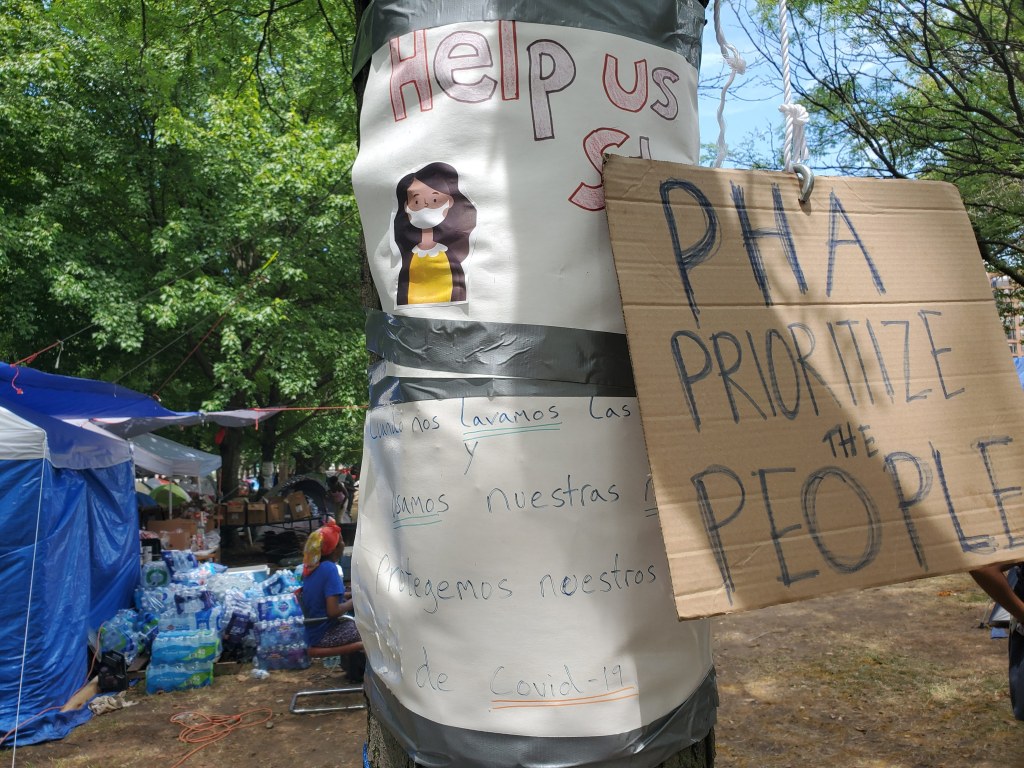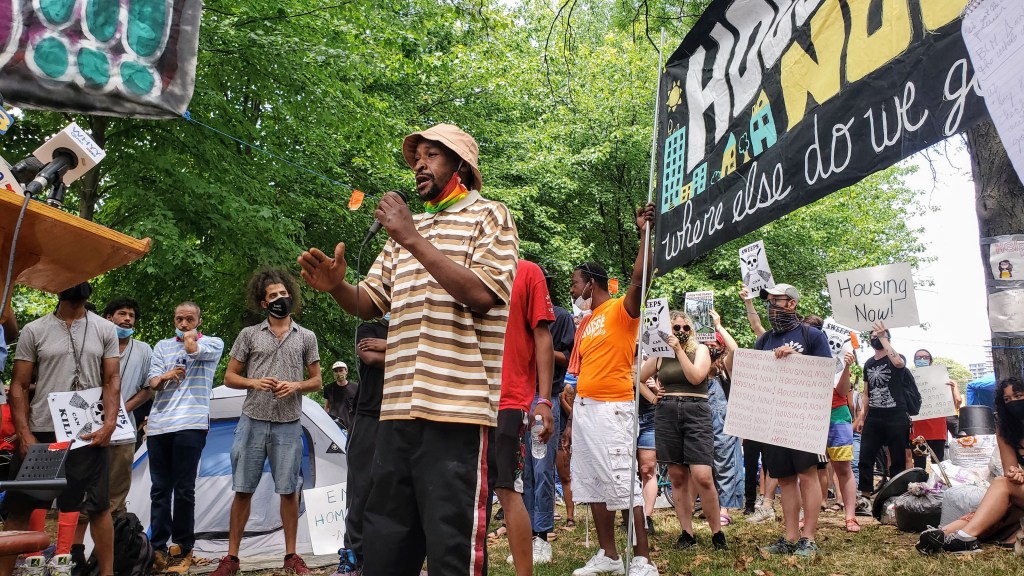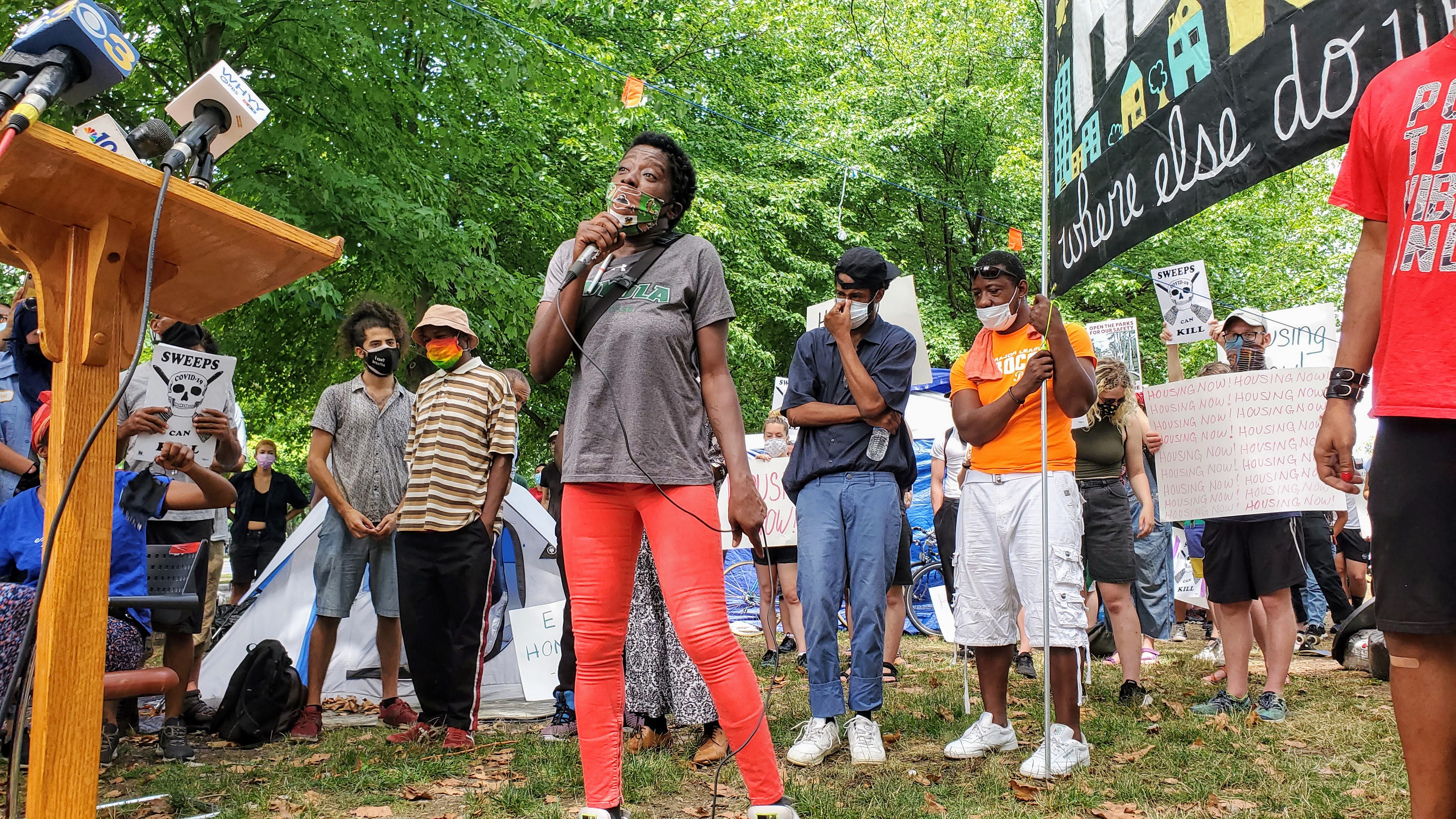Dee Black speaks at JTD Camp. All photos by the author.
by Maddie Rose
A New Kind of Encampment
The James Talib-Dean (JTD) Camp was constructed on June 10th, 2020, starting with just a few tents that quickly exploded into hundreds. This occupation is unlike others the Philly left has seen—a mix of an anti-cop protest and an unhoused camp, most of its residents arrived through word-of-mouth among the unhoused communities across the city. But they are organizers, they have demands, and they have built a home here.
The city has since tried to evict the camp nearly a month later on July 17, only to be met with community resistance and a realization that the camp is more organized than they had thought. Today, visitors to the camp are met with a donations station—sprawling behind it, an extended closet of donated clothes sorted into bags, and beyond that a food tent, complete with a full kitchen setup. Hundreds of tents stretch along the strip of the Benjamin Franklin Parkway that residents have made their home. Handwashing and sanitation stations and “masks required” signs are grim reminders of the cruelty that many people are living without shelter during a pandemic.
Unhoused organizers formed the encampment with the support of organizations like Occupy PHA and the Workers Revolutionary Collective, with the recognition that the city was not going to provide sustainable housing to residents living rough through Covid-19, instead routinely dismantling encampments. Unhoused residents met with organizers and each other and formed demands, including asking the Philadelphia Housing Authority (PHA) to transfer its thousands of unused properties to a community land trust so that unhoused residents could obtain shelter. They demanded that the parkway be sanctioned as a no-cop zone, and that it fire cops that fail to treat unhoused citizens with respect.

“We want our rights back”
When I met Dee Black, a key organizer of the JTD encampment, she was pitching a donated tent with expert speed, right in the middle of a designated pathway. This was because the recipient’s partner was in the tent next door and she wouldn’t separate them—a stark contrast to the city’s method of ripping apart couples when placing people in temporary housing. She brought me to her tent-porch with a few chairs for visitors.
Black has been without stable housing for seven years and had been living in Love Park before moving to JTD camp. She arrived on one of the first days of the encampment, showing up in the rain and setting up near the heart of the camp. Her involvement in the camp first began through her brother Ron, who got her starting to pitch in around the camp. “I started helping out sorting clothes, then [getting] more into the meetings we’ve been having—having more opinions. Then I came up with the idea of wanting to do signatures on a petition.”
Black became a passionate advocate for the demands that she and other camp organizers feel are easily achievable and fair. “We are telling the state, ‘we want our rights back.’ We want y’all to give us what we’re asking for. More buildings for shelters. More resources, because at the end of the day if you can give people who have housing and jobs more resources, why can’t y’all give us that? We need more funding for low income people like me who have no cash. We need a big building where we can say, we’ve made it, we’ve succeeded at something we put our mind to.”
Underneath the current of confidence and leadership is buried a streak of frustration, knowing how different her life could otherwise be. Out loud she wonders, “Has the president right now been in our shoes? Has he struggled, been on the corner, saying “I need change?” It makes you ask—why am I doing this? Why am I struggling to be in the corner holding up a sign? If the government is supposed to be helping us out, why am I holding up a sign to say ‘I need money’ or ‘I need food.’ I shouldn’t have to hold up a sign to say I’m hungry.”

Radicalized and Ready to Take a Stand
Black moved from self-criticism for the perceived personal failings that led to her housing instability to righteous anger. She feels she made mistakes, but that no one gave her a chance to redeem herself. Discussions in camp meetings about housing as a human right and the city’s financial ability but blatant refusal to provide immediate long-term housing offered a shift in her perspective.
Seeing over a thousand signatures on her petition was the proof she needed that others agreed with her—she deserved better than the meager services the city had offered. Black realized that her right to housing was something she could demand. “I didn’t really realize until [camp organizers] told me that our signatures were getting up there. It’s a big thing—our voices coming out and being heard.”
The original camp organizers and supporters served as her support as she learned to advocate for herself. “Even though I have had a backbone of a person speaking out for me, now I can stand up. Because a person is coming out to say they have my back.”
Black has felt the pressure of organizing during an intersection of crises: both health and housing. “It’s kind of hard, knowing that I’m not just speaking for myself, I am speaking for every individual that is homeless out here, that’s 200+ that we have out here.” Of the camp residents, the vast majority were unhoused prior to the encampment. “This is not a protest for us,” Black says. While many do identify their occupation as a protest, Black feels she never made an active choice to protest. “This is just the means that is necessary for us to have a stable household. To have a stable job.”
After speaking with strength and determination, her voice breaks when she speaks of her kids—”I don’t want to bring them into this situation”—and all the other kids separated from their parents due to their lack of stable housing. “Many of us women and men out here have kids. We want to push to get a house for them, and for ourselves. We are standing up for our kids too.” Stable housing is the key to bringing families together. “At the end of the day we need something we can call home, that is safe, that we can bring our families and our kids to. We’re dying for our families to see us.”
Her plans as an organizer are only continuing to grow. “I’m coming up with ideas, like a girls’ meeting. I feel like us females should have that. Some of us have anger, and we need to do something creative, we need to talk it out or walk it out.” The camp is predominantly male which has led to some concerns from women residents. But like Black, there are several confident women leaders including trans women who mother and care for the camp residents.

Housing, Not Services
Black has a dream of a feasible offering the state could make: “All we’re asking for is the government to help us say yes to improvement. I don’t care if it’s one huge building, just one building for us to get into and say that’s where we can call home. Like—Hahneman. Hahneman is shut down. They got this building which they are not using, where there are homeless people in the vicinity of the hospital. It’s easy for them to let us use that.”
What would they do with a big building, or the unused public housing that PHA has let sit abandoned? She explains that “We got some of us in here that know how to fix cars, houses, you name it, we know how to fix it up. Just give us the time of day.”
This isn’t a pipe dream either. Organizers have already housed over 50 families in abandoned PHA property without PHA’s consent, renovating houses to make them livable, ensuring electricity and water are working, and making them into homes.
Those without houses are sleeping outside on the field partially because shelters and Covid-19-prevention hotels have been inaccessible. Black explains that it is “beneficial to have us out here rather than in a shelter, because you’ve got people that [are] flagged for six months to a year from a shelter, that depend on outside for everything. Depend on people giving you food. Depend on getting the stuff I need.” She sighs. “It was my fault, the reason why I got put out of the shelter.” Still, she maintains that is not a reason for her to be left without any type of shelter. “We all got health reasons that we shouldn’t be out here at all. One of our clients is getting us into hotels, if you are diabetic or athsmatic or have other critical conditions.” But high-risk residents are not the only people who require housing during a pandemic. “At the end of the day we need help for other people who don’t have health concerns. We need to get them into housing as well.”
She emphasizes that housing, not services, is what’s needed. “How do you expect us to get a house if you aren’t giving me cash but you’re giving me food stamps. I can’t get stable. I can eat. But I can’t get the necessary stuff that I need if I don’t have the cash for it. Food stamps [are] only even for a limited amount of time, how long is it going to last? 6 months to a year, they might cut you off, then what are you left with? What do you have to show for it?”
They might be asking for housing from the government, but the spirit of the camp is about self reliance and dependence in many ways. They have seen the failure of the state and homeless services, and are more interested in running services for themselves, as the people who most know what they need and what their lives are like. “We might have our addictions as a community, but we work together and try to work through it as a community of homeless people,” Black told me. The community support, resources, narcan and watchful eyes of neighbors on each other’s tents speak to this goal.
One of the tensions between the camp and its ritzy Center City neighbors is the cops’ inability to police the camp and its residents. Black tells me “It is beneficial to have a no-cop zone. It gives us time to dwell on what we need to do, as far as what steps we need to take, to get this paperwork done or that paperwork done, get approval from this person or that person.”

Backbones Needed
She hopes that her petition can contribute pressure on the city, both to provide housing and to end their threats to prosecute organizers who move tenants into unused housing. “If I can prove with this website [that] we collect over a thousand signatures, what more can we ask for? Nothing else can speak for that.”
At the time of reporting, her petition has over three thousand signatures. Still, the city has continually refused to meet housing demands. Black insists, “If you aren’t going to give us what we need, we’ll get signatures to force you to give us what we need. And that’s what we will have to rely on the [intelligence] of lawyers and judges.”
She has a request for the wider Philly community. “We aren’t asking for money, but for donations, where people can make or buy supplies or volunteer. I’m trying to get more people out here to help us out a little bit more. Sometimes it feels like… who can hear us but us? Who can say something but us? Who can hear us if we don’t speak out?”
The supporters who have rallied around her she calls a blessing. “Because at the end of the day, I need backbones to help me out besides signatures. We want more people to show us that they do care.”
Maddie Rose is a freelance journalist and housing organizer. Their work has previously appeared in Teen Vogue and Shadowproof. You can reach them at @uliveinasociety on Twitter.
